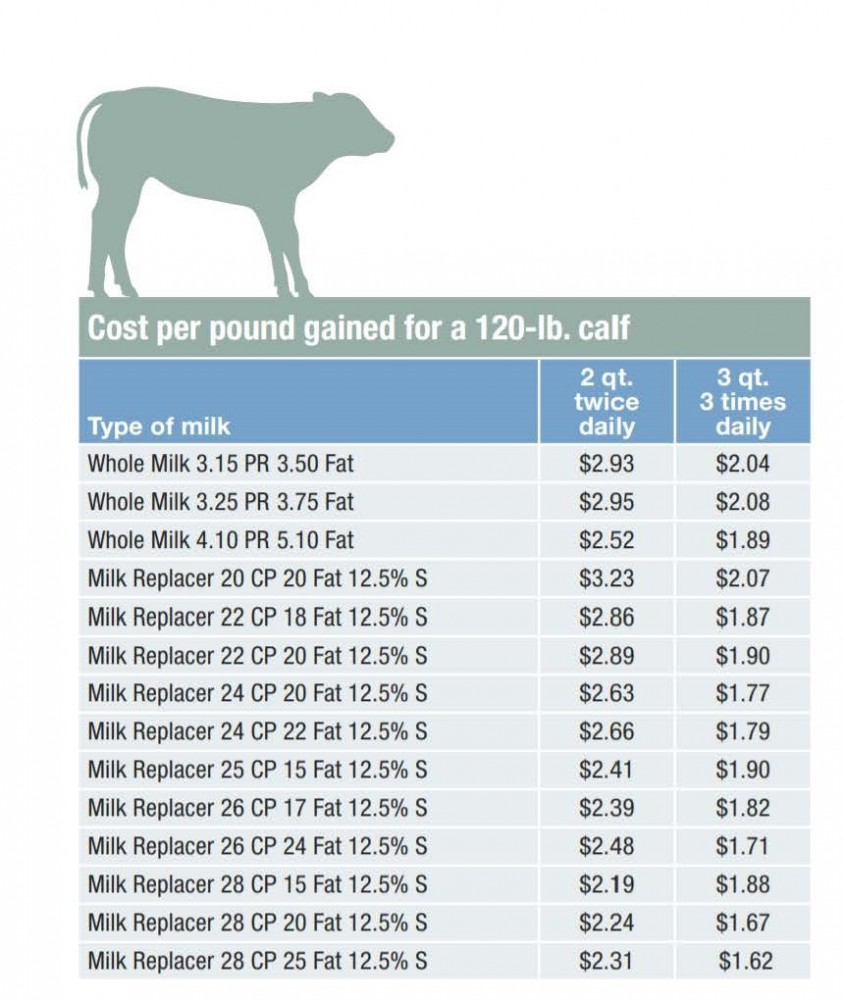Feeding More Milk to Make More Milk
Alycia Drwencke, Dairy Management Specialist
Southwest New York Dairy, Livestock and Field Crops Program
Dr. Valerie Smith with Dean Foods Dairy Stewardship Program is a licensed veterinarian and expert in dairy cattle health and welfare. Dr. Smith is certified by the National Milk Producers Federation as a F.A.R.M. auditor and trainer, and by PAACO(Professional Animal Auditor Certification Organization) as a DairyWell auditor. As part of Dean's December update, Dr. Smith shared information on how feeding calves larger quantities of milk can result in greater production later in life.
Feed More Milk to Make More Milk, Dr. Valerie Smith
"Feeding more milk will result in the calf gaining more lbs per day, which will reduce the cost per pound gained. This will reduce the cost of raising dairy replacement heifers and the heifer will enter the milking string at a younger age, therefore increasing profitability. The amount of weight a heifer gains daily is directly correlated to milk production, so if a producer maximizes how much weight is gained early, then they will receive more milk when the animal enters the milking herd.
Calves that gain weight at a faster rate will have reduced medicine costs for disease treatments, will have lower mortality rates and actually require less labor. These heifers will reach breeding height and weight sooner, calve at an earlier age and produce more milk than heifers that are raised on 2 quarts of milk twice a day with calf starter, and thus result in a higher profitability. Calves fed a full-potential liquid diet versus a more conventional diet will eat as much or more starter at weaning than calves fed a lower amount of milk nutrition. Making calves eat too much dry feed at younger ages is actually detrimental to rumen development.
When can you start feeding at an increased rate? Immediately. Best practice would be 3 to 4 quarts colostrum within 1 to 4 hours after birth and 2 additional quarts within 12 hours after. On days two and three feed transition milk at 2 quarts three times daily. And while 3 quarts twice a day is better than the traditional 2 quarts 2x daily, it's still not enough to give calves the nutrition needed to reach their full potential for growth and development. Feeding a full potential diet of at least 8 to 9 quarts of liquid per calf per day - delivered in 3 quarts three times a day or 4 quarts twice day - can help calves achieve optimal performance. Not doing so will limit heifers from reaching their full potential.
A common misconception is that more nutrition can cause scouring: Manure may appear loose, but it is not truly scours. An increase in liquid manure is due to the higher level of milk nutrients consumed. It is always a good idea to consult your veterinarian before determining the cause of calf diarrhea.
Also, feeding through a bottle with a nipple rather than a bucket, will help slow down the passage rate and increase salvia. Having saliva adds more enzymes that promote protein and fat digestion.
If you want to know more about feeding heifers for their full potential contact your local Dairy Stewardship specialist."

*Dairy Herd Management, Robert B Corbett DVM, PAS May 18 2018
You can learn more about The Dean Foods Dairy Stewardship Program on their website.
Upcoming Events
Boots in the Barn: Cornell Dairy Research Updates
January 13, 2026
January 20, 2026
January 27, 2026
February 3, 2026
February 10, 2026
February 17, 2026
February 24, 2026
Join us for some or all!
Deerworm and Flukes in Small Ruminants Webinar
February 25, 2026 : Deerworm and Flukes in Small Ruminants Webinar
Dr. Mary Smith from Cornell's College of Veterinary Medicine and Dr. Rachel White from UMaine Cooperative Extension will be discussing the lifecycles, signs, prevention, and management of deerworm and liver flukes in small ruminants.
NYSDEC How to Get Certified Course
March 3, 2026 : NYSDEC How to Get Certified Course
Ellicottville, NY
NYSDEC training course in preparation to take the pesticide applicator exam.
Announcements
Cows, Crops & Critters Newsletter Sponsorship
TRYING TO REACH GROWERS AND AGRIBUSINESSES IN OUR SOUTHWEST REGION OF NEW YORK?Weekly Email Update: Shared with 625+ households who have signed up with our program.
Monthly Paper Mailer: To reach our stakeholders and farmers who lack internet access, we send out a monthly mailer where your company's logo and contact information would be featured with a mailing list of 330+ households.
If you sponsor our weekly and monthly publications you reach approximately 955 households.





